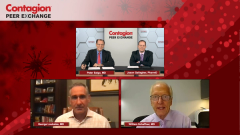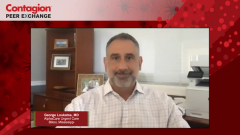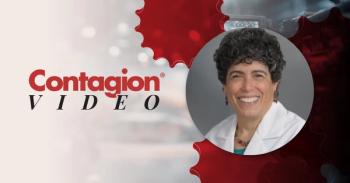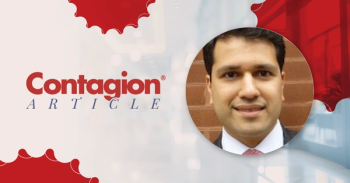
Discrepancies in Messaging With COVID-19
Challenges in messaging as the understanding of COVID-19 evolves.
Episodes in this series

Transcript:
Peter Salgo, MD: It’s possible that people have been lulled into a false sense of security with the COVID-19 vaccine and think it’s OK to go out into the world, not mask, ignore social distancing, and stop washing their hands as scrupulously as they were before because they’re COVID-19 resistant, and they’re not thinking about the flu. There’s some infection fatigue, if you will, Bill.
William Schaffner, MD: Yes, or vaccine and infection fatigue. Of course, it’s still the summer, and knock on wood, we haven’t seen any influenza of note yet. It’s still early, so why should they be thinking about influenza? But we’re all thinking ahead. It’s just a few months down the road. As we said at the top of the show, we’ll see what flu is up to this season.
Peter Salgo, MD: Right. Hopefully we won’t get a lot, but if people start taking their masks off, we might be back to square one. George?
George Loukatos, MD: Yes. I don’t want to say that I’ve lost hope and the scientific messaging is falling on deaf ears, but one thing that the pandemic has proven to us is that no matter how much information we try to put out there, the public is going to come up with their own perceptions based on social media and their own experiences. We as a medical community have learned that we need to be consistent in our messaging. Unfortunately, that’s been difficult to do with the pandemic because things have changed on us so much. The initial messaging was, “Get your vaccine and you won’t get COVID-19.” And now we’re finding that you will get COVID-19, but you won’t be in the hospital and you won’t die from it. Even there, the message to the public has changed.
For me, it’s been a constant learning experience and trying to stay ahead of the curve of what the newest information is. Look at how many times the CDC [Centers for Disease Control and Prevention] and the World Health Organization have changed directions on us, and the data they’ve put out. It’s no surprise that the public is confused and there’s the reluctance to say, “Yes, I’m going to accept this information.”
Peter Salgo, MD: Something that occurred to me as you were speaking is a misconception on the part of the public as to what the scientific method is altogether. They’re looking for absolute certainty. They’re looking for, “The CDC said this. That’s it. It never changes. We understand everything. Let’s go forward.” Then you change the message a little because what you understand has changed and become more subtle. And what you hear is not, “Oh good, they’re looking.” It’s, “They lied to us.” That’s a problem in messaging, isn’t it, Bill?
William Schaffner, MD: Absolutely. It’s hard to unring the bell. And people would like simple answers to complex circumstances. We’ve tried to tell people that when we started to deal with COVID-19, we opened our textbooks and there were only blank pages. We’re writing the textbook as we’re going along. Obviously, as we learn more, we’ll tell you more, and we’ll modify what our recommendations are. Some people understand that, while others don’t.
Jason Gallagher, PharmD: And even those who understand have the pressures of social media, as George brought up, and sometimes pounce opportunistically on one of those nuances or a change and push it to a direction that becomes black and white when it’s actually in a spectrum of gray.
Peter Salgo, MD: Do you know anything in medicine that’s ever black and white? I’m trying to think hard. I don’t know.
George Loukatos, MD: No, but I agree with all of you. The perception of the public is basically, “If my doctor tells me this, I’m going to take it as the word of truth and unvarying from that.” Maybe we haven’t done a good enough job as a medical community educating our patients that science is not static or absolute.
Peter Salgo, MD: Medicine in particular. I was always taught in physics that if you had a theory and you observed 1 exception to that theory, your theory is false. In medicine, if you have a theory and there’s an exception to the theory, it’s statistically reasonable, and you go on from there. It’s biology vs absolute science. That’s a significant difference that I’m not sure the public understands, and I don’t think public media emphasizes.
Jason Gallagher, PharmD: Totally.
Peter Salgo, MD: I want to thank all of you out there for watching this ContagionLive® Peer Exchange. If you enjoyed the content, please subscribe to our e-newsletters to receive upcoming Peer Exchange segments and other great content right in your inbox.
Transcript edited for clarity.
Newsletter
Stay ahead of emerging infectious disease threats with expert insights and breaking research. Subscribe now to get updates delivered straight to your inbox.


































































































































